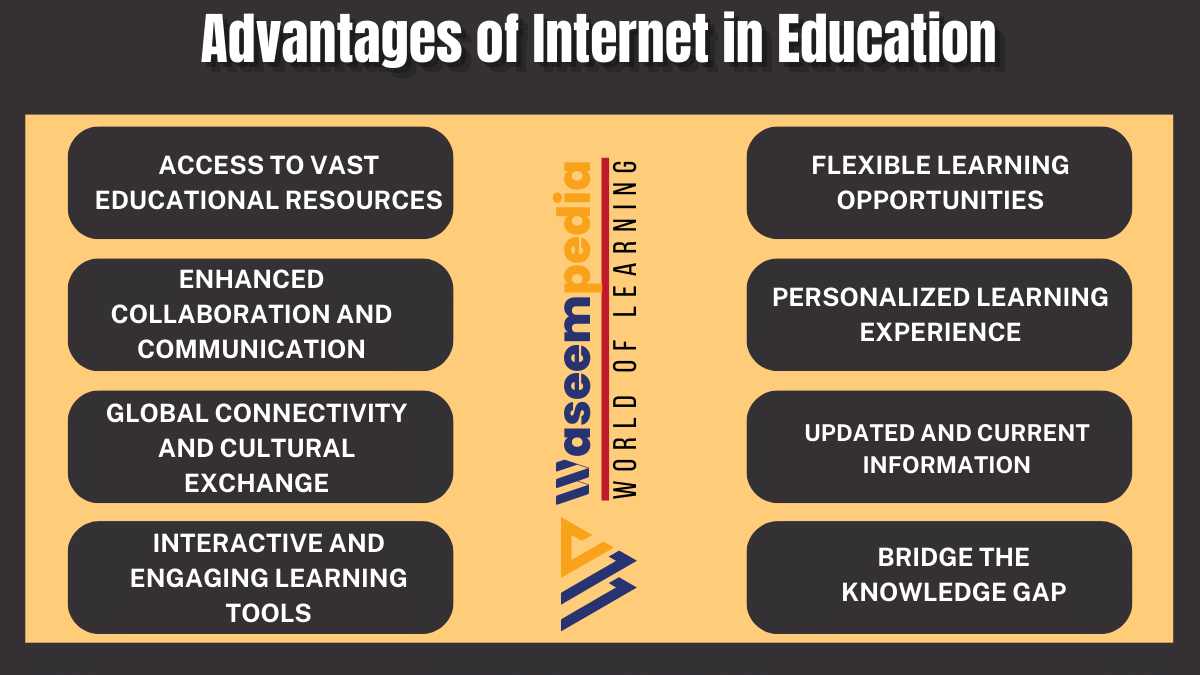Advantages of the Internet in education are undeniable. The Internet has transformed education, making it more accessible and exciting for students. It offers a vast array of learning resources like books, articles, and videos that we can easily access.
With interactive tools and games, learning becomes enjoyable and personalized. We can study at our own pace and connect with students and teachers from all over the world, making education a fantastic adventure.As technology continues to advance, the Internet will undoubtedly play an increasingly vital role in shaping the future of education.

Internet has revolutionized the field of education, providing numerous advantages that enhance the learning experience for students of all ages. From online courses and virtual classrooms to research resources and interactive tools, the Internet has become an invaluable asset in education. In this article, we will explore the advantages of using the Internet in education and how it has transformed traditional learning methods.
Education is no longer limited to the four walls of a classroom. The Internet has opened up a world of opportunities, providing access to a wealth of educational resources and facilitating new modes of learning. Students, educators, and institutions are leveraging the advantages of the Internet to create engaging, interactive, and personalized learning environments.
10 Advantages of Internet in Education
10 Advantages of Internet in Education are as following
1. Access to Vast Educational Resources
The Internet provides access to an extensive range of educational resources, including digital libraries, online textbooks, scholarly articles, and educational websites. Students can explore various subjects, access reference materials, and gather information from reputable sources.
This wealth of resources expands learning beyond the limitations of traditional textbooks, allowing for a more comprehensive understanding of the topics.
2. Flexible Learning Opportunities
Internet-based education offers flexibility in terms of time and location. Students can access learning materials and participate in online classes at their own convenience, eliminating the constraints of fixed schedules.
Whether it’s a working professional pursuing further education or a student balancing multiple commitments, the flexibility of online learning enables individuals to tailor their education to fit their lifestyle.
3. Enhanced Collaboration and Communication
The Internet facilitates seamless collaboration and communication among students, educators, and peers. Online platforms, discussion boards, and video conferencing tools enable students to interact with each other, engage in group projects, and receive feedback from instructors.
This collaborative approach promotes active learning, peer-to-peer knowledge exchange, and the development of essential communication skills.
4. Personalized Learning Experience
Internet-based education allows for personalized learning experiences tailored to individual students’ needs and learning styles. Adaptive learning platforms and intelligent tutoring systems leverage data and algorithms to provide customized learning paths, adaptive assessments, and targeted feedback.
Students can learn at their own pace, focus on areas that require additional attention, and receive personalized support.
5. Global Connectivity and Cultural Exchange
The Internet breaks down geographical barriers, enabling students to connect with peers and educators from around the world. Virtual classrooms, online forums, and collaborative projects foster cultural exchange, intercultural understanding, and the development of global perspectives. Students gain exposure to diverse cultures, ideas, and viewpoints, broadening their horizons and fostering a global mindset.
6. Updated and Current Information
The Internet offers access to real-time and up-to-date information, keeping educational content relevant and in line with the latest developments.
Online journals, research databases, and educational websites are constantly updated with new findings, research papers, and emerging trends. This ensures that students have access to the most current and accurate information, preparing them for the rapidly evolving world.
7. Interactive and Engaging Learning Tools
Internet-based education employs a variety of interactive and engaging learning tools that cater to different learning styles and preferences.
From multimedia presentations and videos to gamified quizzes and virtual simulations, these tools make learning more interactive, enjoyable, and memorable. Visual and interactive elements enhance comprehension, engagement, and knowledge retention.
8. Distance Learning and Online Education
The Internet has made distance learning and online education a viable option for students who are unable to attend physical classrooms. Whether due to geographical constraints, health issues, or other commitments, students can pursue their education remotely.
Online degree programs, virtual universities, and Massive Open Online Courses (MOOCs) offer accessible and affordable educational opportunities to a diverse range of learners.
9. Virtual Experiments and Simulations
Internet resources enable students to engage in virtual experiments and simulations, providing hands-on learning experiences even in subjects that traditionally required physical laboratories or equipment.
Virtual laboratories allow students to conduct experiments, observe results, and analyze data in a safe and controlled environment. Simulations offer opportunities to explore complex concepts and scenarios, promoting critical thinking and problem-solving skills.
10. Career and Skill Development
The Internet serves as a valuable platform for career and skill development. Online courses, vocational training programs, and certification courses provide learners with opportunities to acquire new skills or enhance existing ones. Students can access specialized resources, participate in industry-specific forums, and connect with professionals in their desired fields, facilitating career exploration and advancement.
Related FAQ’s
Is Internet-based education as effective as traditional classroom learning?
Internet-based education can be as effective as traditional classroom learning when implemented properly. Research has shown that well-designed online courses and virtual classrooms can lead to comparable learning outcomes. However, it is essential to provide adequate support, engagement, and interaction to ensure the success of Internet-based education.
How can the Internet help in accessing educational resources from different parts of the world?
The Internet enables students to access educational resources from different parts of the world through digital libraries, online databases, and educational websites. With just a few clicks, students can access a wide range of materials, including research papers, textbooks, and multimedia content, without being limited by physical location or availability.
What are some popular platforms for online education?
Some popular platforms for online education include Coursera, Udemy, edX, Khan Academy, and LinkedIn Learning. These platforms offer a wide range of online courses, certifications, and learning resources across various subjects and disciplines.
How does the Internet promote collaboration among students and teachers?
Internet promotes collaboration among students and teachers through various means, such as online discussion forums, video conferencing tools, and collaborative document sharing platforms. These tools enable students and teachers to interact, exchange ideas, work on group projects, and provide feedback, fostering a collaborative and engaging learning environment.

